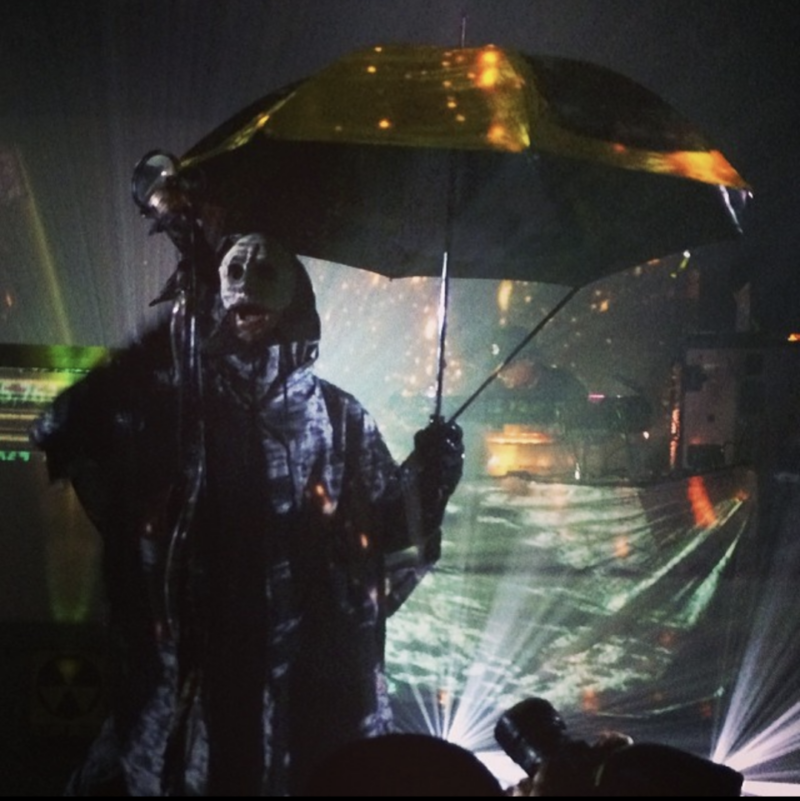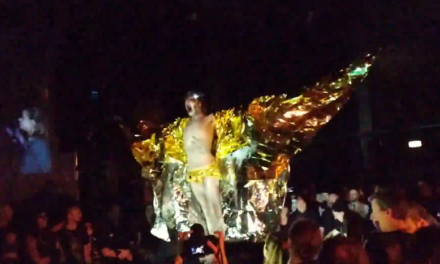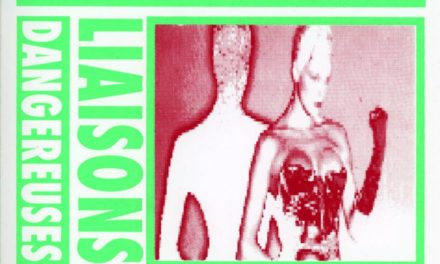It’s been a while since we had a guest post here on ID:UD, so if this is your first seeing one, let us introduce you to Outland – a broad label we use for any contributions to the website that are not made by the Senior Staff. This time we’ve got a monster essay from longtime friend of the site Ian Williams on his personal relationship with Skinny Puppy. Ian was one of the folks we first connected with working for major media outlets that had a proper working knowledge of the genres we cover, and it’s a real pleasure to be able to host his writing, especially on a topic so very close to our own hearts.

I first encountered what the ID:UD masterminds term Our Thing my freshman year of high school. Already deep in the weeds of punk rock, particularly Lookout Records and Dischord, I’d developed an attendant distrust of all things electronic in that specifically Gen X genres as masculinity sort of way. I started catching rides back from school with a senior girl; we shared a Latin class as our final class of the day, and I hated taking the bus. We rode together often during that second semester of freshman year, listening to various albums in her rickety Volvo.
One afternoon, she played Nitzer Ebb’s That Total Age. I told her I wasn’t sure if I liked it, but that was all the residual stuff about the rightness of various types of music speaking. The truth was that I liked it an awful lot and I wanted more, even though my encounters with Our Thing were, in those early years, done in fits and starts as I negotiated the social propriety of a 14 year old punk rocker listening to bleeps and bloops.
The other truth was that I was falling out with punk rock in the same fits and starts. Something about the calls to action rang hollow in a world where Bad Religion (not really productive of bangers in retrospect) and Green Day (very much productive of bangers) were on major labels. And I was depressed, a fact which will underpin this article about Skinny Puppy. That depression demanded something different than punk provided me. I had Joy Division and Nitzer Ebb, but those were starting points, not finish lines.
I hit the music stores and nabbed what looked interesting: more Nitzer Ebb, the requisite Nine Inch Nails, Front 242, KMFDM. Eventually, based on rumors I’d heard and the cool album art, I bought Skinny Puppy’s Too Dark Park. That’s when Skinny Puppy became a presence in my life. It was and is an amazing album: layered, dark, weird, but this isn’t something that needs to be repeated here for the thousandth time. Everyone knows.
Skinny Puppy mostly lingered at the periphery of my musical tastes. It’s not that I didn’t like their catalog but it was too challenging and abrasive to listen to regularly. When I became an Our Thing DJ in the early 00s, I’d break out Skinny Puppy only irregularly, invariably because someone requested “Assimilate”. A fine song but not really what drew me to them. But my personal life was and is punctuated by these intense listening sessions, sometimes stretching for months at a time, in which I would only listen to Skinny Puppy on repeat, working through the albums before starting over, spending extra time spent with Too Dark Park. They were sudden, jagged, strange moments of obsession, and I didn’t have an explanation for them. They just happened.
—
In spring of 2019, I had something close to a depressive breakdown. I was a successful writer, albeit freelance, and my main source of income, VICE Sports, had shuttered for the second and final time, leaving me with a return to constant pitching. I’d run up credit card bills because the same VICE left my payments for work completed in limbo for six straight weeks. My dog, who had been a source of constant comfort when I was largely housebound with severe Crohn’s disease, died. I’d returned to school late in life to finish my bachelor’s degree and found myself accepted into a PhD program—this was a source of joy but it also felt like an enormous chasm yawning before me. And I simply broke. The depression felt physical: at times I would clutch my head as if it were threatening to split open. I finally got my diagnosis of depression and some Wellbutrin, which helped raise the floor but also completely destroyed my ability to write. So, I stopped taking it.
I’ve never been one to sidestep my depressive episodes. They’re largely infrequent in their acute form and my dirty secret is that I secretly enjoy lingering in them to explore those sensations. Not because they’re pleasant, but because they are not. Because there’s something which feels true to them, even though I reckon that this might not be true in turn. There’s a permeability to the senses which doesn’t escalate to delusion or hallucination but creeps to the border before dying back down again. If this is false, and it almost certainly is, then the alternative of Wellbutrin, forced LinkedIn productivity cheeriness, and TikTok pep talks from Jeremy Usbourne level life coaches seems bleaker.
And I found myself listening to Skinny Puppy again during this episode.
What I’ve realized since is that Skinny Puppy sounds like my depression feels, hence the spikes of interest timed rhythmically to my mental state. I want to be clear about what I mean: it isn’t the lyrics or discrete sounds or a specific meaning but rather the sum totality of Skinny Puppy. I would never, could never, walk up to the surviving members to tell them that this or that song spoke to me or got me through a hard time. There is no speaking, there is no getting through. There isn’t any meaning, though their work is full of it, which speaks to my depression. It feels like my depression feels in a barely articulable way. And I rather like that, as it turns out. I feel not so alone, though I don’t feel better, precisely.
I’m not the only person I’ve met who feels this way. Someone close to me can’t listen to them at all because, they claim, it sounds like their anxiety and they don’t like that feeling. It’s a disruptive reminder that the interior and exterior aren’t as bifurcated as we would assume.
From a 1991 interview with Skinny Puppy, when Dwayne Goettel was asked how it felt to join the band:
Dwayne: “I was scared, it was so loud, I came into the studio and everything was just blasting.”
cEvin: “Dwayne used to hold his ears all the time.”
Ogre has said that he makes music about what scares him. That fear of what’s inside or what threatens to enter you suffuses Ogre’s and Goettel’s statements. I was so scared, I am so scared, yet I keep doing it.
S. Alexander Reed’s Skinny Puppy chapter in the appropriately named Assimilate talks about the repetition of the traumatic as abreaction, as well as the band’s unique (at their founding) connection with female fans in their recognition of the inconstancy of the body and definitions of wholeness. I want to expand by reiterating the terror which comes with those markers. A yearning for some other configuration of the subject/object relationship is present in swathes of philosophy and art: it’s there in Spinoza’s monism, the early Marx’s theory of alienation, Horkheimer’s examinations of Enlightenment rationality, Weber’s disenchantment of the world, the art of Bacon and Beuys, and in Kristeva, who Reed draws upon.
It’s scary for the wall between subject and object to come tumbling down, even as it is an affirmative act to tear it down. It requires living in the wound inflicted upon us in the imposition of (take your pick) capitalism/language/rationality upon us as we are subjectified. The abject is where the wound is, neither subject nor object.
Skinny Puppy is often described as being inhuman in their sounds and motifs. I think the opposite: that they are more human. It’s in the moments of non-music or non-sequitur that they are most that. It isn’t machinic, though they use machines, because the sound in so many heads is the sound of swirl, of clanging, of shrieking. Decoding Ogre’s lyrics is an exercise in frustration, not because they are meaningless but because the act of imposing a settled meaning is exactly the violence which he is observing. Music as fixed, systemic language does the same for Goettel’s samples or Key’s rhythms.
They’re just goofy horror fans, at heart, and it’s true, but therein lies their power. Mark Fisher, in an essay on Joy Division and depression, warns against artificial binaries of aesthetics and empirics. Joy Division were both “the Joy Division of Pure Art, and the Joy Division who were ‘just a laugh’—at once”. This is the power of their, as he calls it, sorcery: it is only the normal person who can work the power of observation. Not observation bereft of politics but a pastoral shamanism which conjures as it observes and foresees the impending terrible. Think of Skinny Puppy’s songs about animal rights which rarely rise to the bait of overt commentary but instead demand you occupy the role of animal. Or the simple story of their name: what would it be like to see through the eyes of a dog? And what would it mean to embody those roles, to cease wondering and commence doing the observation, because observation is never passive?
A simultaneous inside/outside of body, mind, other, self. Ogre’s favorite album is Joy Division’s Closer.
—
My favorite Skinny Puppy song is “Worlock”. It’s a terrifying song which I’ve been preoccupied with for years and which, in the lead up to this essay, I’ve been revisiting with a vengeance via long discussions with others, to whom I owe a debt for helping me think Skinny Puppy through.
The obsession—and not for nothing I underwent a brief depressive spell early this year—has developed into the iconic repeated sample of Charles Manson stating that “now is the only thing that’s real” becoming shorthand for a philosophical problem: that the past is verboten and the future is only more of the same as now. Again, terrifying.
What is this song? Multiple meanings. I’ve found people claim it’s about the death of the 60s—Manson is right there—or Ogre’s breakup with film professor Cyan Meeks, who he nicknamed Blue. It’s about drug abuse (hot blood guilt optic nerve). It’s a call to action: carpe diem (softspoken changes nothing). But Manson Family member Sandra Good was nicknamed Blue and Horace Badun’s voice actor in 101 Dalmatians was named Frederick Worlock. The song contains all of these meanings and none of them. The ambiguity as we pick out lyrical meaning in Ogre’s words or sonic meaning in Goettel’s wall of noise sampling before collapsing back to a state of unknowing is what matters. In the abject, language falls away.
The search for explication parallels Manson’s search for hidden meanings in “Helter Skelter”, his singing of which is also sampled. All I know is that this pronouncement that now is the only thing that’s real scared me then and scares me now, even as it drives my academic work. If you listen to the sample in its context, more unsettling is that the great villain of Americana, Charles Manson, makes more sense in this moment of a false prophet’s anger than not:
“Look at the madness that goes on, you can’t prove anything that happened yesterday. Now is the only thing that’s real. The truth! They can’t stand to look at the truth in themselves, they persecute themselves. They’re butchering themselves every time they go on the freeway. They hate themselves. Look at the signs: stop, go, turn here, turn there. You can’t do this; you can’t do that. You can’t, you can’t, you can’t. This is illegal, that’s illegal, everything’s illegal. The police used to watch over the people, now they’re watching the people. The President doesn’t represent the people, he should be on the roadside picking up his children. But he isn’t.”
How could we disagree after Jordan Neely’s killer gets the stamp of approval from the NYPD? After George Floyd? How can we prove the past when it’s owned by a handful of corporations obliterating film and sound archives daily, if we even want to reference a reviled past which we insist teaches nothing at all? How does the President represent the people in an era of endless wars, felonious conspiracy, and debt ceiling cowardice? What of the by now guarantee of ecological collapse? Does now make more or less sense than Ogre’s lyrics? Than Goettel’s stabbing rearrangements? Than Manson’s observation? Is now more or less frightening than those things?
I do not want to be misread: Manson was a monster. But if you look at that quote or listen to “Worlock” and see a snippet of revelation there, it’s unsettling (unsettling peace, doing crazy things). It should be. What does it mean when our monsters sometimes say true things about the monstrous systems which we’ve erected?
In an interview with Little Punk People, Ogre states:
“Well, blue has always been following me in various forms. One of my ex-girlfriend’s name was Cyan, and cyan is a form of blue. And I’ve always been obsessed with the blue of a form of emotion, which is Picasso’s Blue Period. It was very beautiful. And blue also represents somberness sometimes, and depression. And I’ve dealt, certainly, with my struggles with depression, so I use it as a colorful way to represent some very dark moments. And finding blue and going through it is a very powerful thing to do. Not avoiding it but going into it and learning about it.”
Blue. Lived in depression. Love found and lost. Murder and prophecy. Unheimlich.
—
I finally got to see Skinny Puppy live in Asheville last month after 30 years of waiting. Two-thirds of the way through, my 45 year old knees were creaking and I had to pee. I told my brother I had to duck out for a few and may not be able to push through to get back to the stage, given that it was wall to wall people. The view from the back was more than fine (Orange Peel, you have a great setup visually). But I felt the buzz of a text against my thigh. It was my daughter, 13 years old, at the show, and more like me than she knows: she broods, too. She’d pushed through the crowd and found her uncle. The text was asking me where I was because the show was awesome.
I made my way back up, but not all the way. I saw her from a distance, hands in the air in time to “Dig It”, little but not as little as they once were, fists punctuating the words. She feels it, too.
Ian Williams is a doctoral candidate in communication at UNC-Chapel Hill and a former freelance writer at Jacobin, VICE, and elsewhere. You can find him on Twitter as @Brock_toon and he sometimes DJs on Twitch at https://www.twitch.tv/brock_toon.




